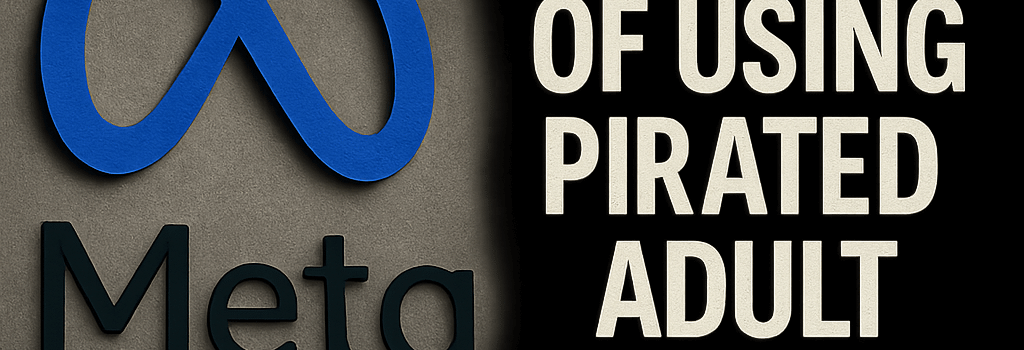Meta Accused of Using Pirated Adult Content for AI Training

Date: July 28, 2025
A recent complaint filed by Strike 3 Holdings in a U.S. District Court in California accuses Meta Platforms of willfully torrenting and seeding copyrighted adult videos via BitTorrent since at least 2018. The lawsuit claims these actions were a deliberate strategy to accelerate downloads of terabytes of training data for Meta’s AI models, potentially exposing minors to age-restricted content and undermining lawful adult sites.
Lawsuit Overview and Background
Strike 3 Holdings, operator of a network of premium adult video sites serving over 25 million monthly visitors, alleges that Meta used proprietary BitTorrent-tracking tools to seed and leech nearly 2,400 copyrighted films. According to the filing, IP addresses tied directly to Meta’s corporate network—and some masked via hidden Virtual Private Clouds (VPCs)—were repeatedly involved in distributing high-quality adult content beyond simple downloads.
Key Allegations and Torrenting Tactics
- Tit-for-Tat Abuse: BitTorrent rewards peers who upload prized content. Meta allegedly exploited this by seeding latest-release adult videos on the day of release, securing faster access to millions of other files.
- Extended Seeding: Some files were seeded for days or weeks, incurring significant bandwidth costs, purportedly to maximize download speeds of other datasets.
- Hidden IP Networks: The complaint names six VPC clusters and a major third-party data center as part of a “stealth network” used to obscure Meta’s torrent activity.
- Employee Involvement: At least one residential IP tied to a Meta employee was detected seeding protected content, suggesting deliberate routing outside corporate premises.
Potential Exposure of Minors and Market Impact
“This will effectively eliminate Plaintiffs’ future ability to compete in the marketplace and provide minors unfettered access to adult content,” the complaint reads.
Strike 3 Holdings argues that Meta’s seeding of premium content enabled access without age verification—contravening laws in jurisdictions requiring strict age checks—and disadvantaged lawful adult platforms financially.
Technical Analysis of Torrenting Patterns
Digital forensics experts point to several technical indicators underpinning the lawsuit’s claims:
- Consistent Piece Hashing: Repeated distribution of identical piece hashes across Meta’s corporate and hidden IP ranges indicates automated scripts, not manual downloads.
- Swarm Churn Rates: Low churn within swarms—peers staying connected for hours—suggests intentional seeding for tit-for-tat gain rather than casual sharing.
- Bandwidth Profiles: Network telemetry from MaxMind–verified IPs shows persistent 100–500 Mbps egress traffic peaks when seeding popular torrents.
Cloud Infrastructure and Data Center Involvement
Strike 3 Holdings alleges Meta routed BitTorrent traffic through multiple cloud regions to obscure origin:
- Six distinct VPCs spanning North America and Europe.
- Usage of a major co-location provider’s IP ranges for high-throughput torrent seeding.
- Cross-region load balancing that distributed torrent packets across hundreds of virtual instances.
Implication: Such an architecture complicates IP tracing and may constitute vicarious infringement if Meta knowingly provided the infrastructure facilitating unauthorized distribution.
AI Training Data Pipeline Risks
Experts in AI data curation emphasize the legal and ethical pitfalls of using pirated media:
- Undisclosed Licensing: Training generative models on unlicensed adult content could violate both copyright law and internal Meta policies.
- Data Contamination: Inclusion of explicit material without filtering risks exposing employees and subcontractors during dataset review phases.
- Model Leakage: Proprietary quality footage may be memorized by large-scale models, leading to replicable scenes in future AI-generated outputs.
Legal and Regulatory Context
The case unfolds against broader legal debates over AI training data:
- Fair Use Doctrine: Courts are still defining whether large-scale scraping for model pretraining qualifies as transformative use.
- State Age-Verification Laws: Florida, Texas, and Maryland have enacted or proposed statutes mandating age checks on adult sites; torrent seeding circumvents these controls.
- EU AI Act (Draft): Future regulations may require demonstrable compliance in training data provenance, heightening liability for infringing datasets.
Expert Opinions
Dr. Elena Rodriguez, Digital Forensics Specialist: “Persistent seeding at scale is a red flag for automated infringement. Network logs and hash analysis often provide the smoking gun in these investigations.”
Prof. Marcus Liu, AI Ethics Researcher: “Using pirated content erodes trust in AI systems and opens companies to legal and reputational risks, especially when the source material is adult content involving minors potentially.”
Conclusion and Next Steps
Strike 3 Holdings seeks both monetary damages and injunctive relief to:
- Force Meta to delete pirated videos from any training datasets and AI models.
- Prohibit future torrent-based data acquisition.
- Require Meta to implement robust data-licensing audits for all AI projects.
The court’s decision could set a key precedent on corporate liability in the AI age, clarifying how copyright law applies to unauthorized torrenting and the role of cloud infrastructure in facilitating large-scale infringement.